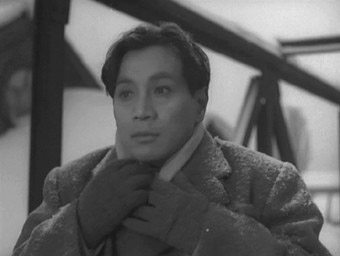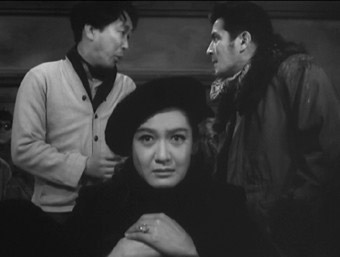|
I've
never subscribed to the notion that movie adaptations of
literary works have to be completely faithful to their source
material. Indeed, in some cases we can be glad they are
not (Jaws springs immediately to mind),
though if enough changes are made to the original story, you can't help
wondering why the movie company paid so much for the
rights to the property in question, considering they clearly planned to use so little of it. Fyodor Dostoyevsky's
The Idiot is a genuinely great work of literature,
but a completely faithful adaptation would likely be a stretch for a theatrical movie, given that it would require a running time of well in excess of four hours.
We know this because Kurosawa Akira, a huge Dostoyevsky
fan, chose to make such an adaptation, and the finished
film ran for 265 minutes.* The studio, Shochiku, was less
than enthralled, and after a single screening of this version, it
cut the film down to 166 minutes for general release. Get
that? 265 minutes down to 166. That meant 99 minutes were
removed from Kurosawa's original, over one-third of its
running time. The cut scenes alone run as long as many movies.
Of
course, the moment Kuroawa shifted the action from late
nineteenth century summertime St. Petersburg to mid-twentieth
century midwinter Hokkaido, he altered a key element of the
novel. The main characters are all there, but have themselves
been adapted intriguingly to their locale. The novel's Prince
Myshkin is now Kameda Kinji, freshly released from an Okinawa
asylum and on his way to visit Ono, a relative in Hokkaido.
Kameda is a war criminal who was sentenced to death but
reprieved at the last minute – a traumatic moment that has
left him mentally fragile, the "idiot" of the
title – and who is unable to lie and whose timid honesty is destined
to profoundly effect others. On his journey he encounters
the self-assured Akama, and despite their considerable differences
the two strike up a friendship. Their paths cross again
later over the notorious and beautiful Nasu Taeko, a woman
due to be married for a sizeable dowry to Kayama, a good
friend to Ono, the very person that Kameda is visiting. This
is where things really get complicated. Kayama, you see,
is a weak-willed man who is marrying for the dowry but is
really in love with Ono's younger daughter Ayako. Akama,
on the other hand, is in love with Taeko and is bullishly
determined to win her hand. Kameda also falls for Taeko,
who is won over by Kameda's simple honesty and devotion,
but believes her own troubled past would destroy him. And
the young Ayako, well she only goes and falls for Taeko.
Following this?

In
terms of character and plot development, Hakuchi
(the Japanese translation of The Idiot) is likely to initially prove a little confusing to those
not familiar with the novel. This is not the fault of the
director but the aforementioned butchering of
his original version. Having such large chunks of narrative
and character detail removed (their placement usually
indicated by sometimes unnecessary-seeming wipes or, in
a couple of cases, textual explanations) results in the
story moving forward in sometimes sizeable fits and starts.
Relationships in particular, developing or otherwise, require
close attention to follow in detail. What is most surprising,
given all this, is how compelling much of what remains still is.
Slowly
paced and at times theatrical in its organisation of character
and action, the Hokkaido winter setting invests every scene
with a brooding, almost other-worldly atmosphere. As snowstorms
rage and winds mournfully howl, they create a sense of dislocated
bleakness that seems to isolate the various locations from
the real world and at times even suggest that portions of
the action are taking place in a surreal underworld. This
is never more vividly realised than when Kameda visits Akama
in his semi-derelict mansion – decaying and snow infested,
it proves a vividly expressionistic representation of Akama's
mindset and his increasing isolationism, carried through
in the lighting, the framing and Hayasaka Fumio's darkly moody score.
Repeatedly,
Kurosawa blocks his characters in triangular fashion, placing one at each side of the frame, where they discuss, address, or are observed
by a third positioned centrally, a visual reflection of the Taeko-Akama-Kameda
love triangle at the film's core. It's a technique tellingly
first triggered by a window poster of Taeko bordered by
the spellbound reflections of Kameda and Akama. Elsewhere,
the camera placement can be every bit as striking,
not least the shot of Kameda viewed through glass trays
of meat knives, recalling both the suggestive handling of
a similar knife in a previous scene, and anticipating an attack that is shortly to follow. Editing and sound are also used
to sometimes impressive effect, with the jump-cuts to Akama's
eyes as he watches Kameda's departure from the mansion prefiguring
Hitchcock's famous pecked-out-eyes edits in The
Birds, while the rapidly cut shots of the approaching
masked skaters at the ice festival have a hint of the
madness into which two of the characters are soon to descend.

The
novel's presentation of Myshkin as an almost saintly figure
of purity and innocence (many have seen him as Christ-like) is effectively captured here. While Akama
and Kayama barter monetarily for Taeko's affections, Kameda
has only his honesty and decency, something neither of his
would-be rivals can compete with, but he has reckoned without
the complications of Taeko's past. Both she and Akama
develop complex relationships with Kameda. Although she
believes her own history would be harmful to him and tells
him he should marry Ayako, she never really stops loving
him, while Akama, jealous of the natural innocence that
Taeko finds so bewitching and at one point threatening his
life, sternly defends Kameda when he is hit and even invites
him to share tea and cakes with his mother. This complex
inter-relationship leads to a memorable final scene with
Kameda and Akama, drawn largely from the novel but as dark
as anything in the director's oeuvre.
Mori Masayuki, later so memorable as Genjurô in Mizoguchi's
masterpiece Ugetsu Monogatari, makes for
an enigmatic Kameda, eyes wide with innocence, his hands
held almost defensively to his chin, but he's given a real
run for his money by Mifune Toshiro as Akama, a figure of
obvious influence and power whose grip on reality is gradually
warped by his obsession for Taeko. It's a performance that
has copped charges of over-theatricality from some quarters,
but for my money he hits just the right note. A similar
charge has also been levelled at Hara Setsuko as Taeko,
but again seems a little harsh – in a film in which the
lead characters are emotionally destroyed by their relationships
with one another, a little madness seems only appropriate.
Hakuchi
may not be one of Kurosawa's finest achievements, and in
this severely truncated form it's impossible to properly
judge it as a complete work. But it's still an often fascinating
film and remained to his death one of the director's most
cherished projects, his only stab at adapting the work of
his favourite author. Inevitably, it leaves you aching to
see the full 265 minute version in its full, uncut, two-part glory. That we probably never will puts the film on
an exclusive list of time and fate enforced cinematic tragedies.
As
with Kurosawa's Scandal,
the good people at Masters of Cinema had some pretty iffy
original material to work with and in some ways the results
reflect that, with the picture lacking punch and the contrast
range not all it could be. But in other ways it delivers
– sharpness and detail vary but are often rather good, daytime
exteriors are sometimes very pleasing, and print damage has
been very effectively cleaned up.
The
mono soundtrack displays more obvious problems, with an
occasionally very noticeable background hiss that appears
and disappears from shot to shot in some scenes, and there
are a fair few minor but noticeable pops in places. That
said, the the dialogue
and the sometimes inventive use of sound – sleigh bells
that rise in volume with Kameda's increasing distress, or the
audio accompaniment to Kameda's recollection of a witnessed
execution (a technique later emplyed by David Lynch in a key scene of The Straight Story) – and are all clear enough.
The
expected Introduction by Alex
Cox gives an interesting overview of the film and the problems
resulting from the cuts.
The
Gallery includes 19 production
stills, 2 portraits of the cast and the director, with separate
enlargements of Kurosawa and the original poster, all in
good condition and reproduced at a decent size.
Finally
there is the usual, rather lovely Masters of Cinema Booklet.
Running 36 pages, which are primarily filled with a detailed
and enjoyable essay on the film by New York based writer
Daryl Chin, though there is also a shorter but equally useful
piece by Yoshimoto Mitsuhiro.
A
bit of research shows there is a fair amount of support
out there for a film that some will no doubt
pass off as a misfire or even an interesting
curio. That we don't have and probably never will have the
full version is a loss to cinema, but that the this version
has been restored by Masters of Cinema is something to
be thankful for. Yes, you'll need to bring your patience
with you, but there are genuine rewards here for the discerning
viewer, and it has its own particular fascination both as
a lesser-seen work of one of cinema's greatest directors,
and as an adaptation of one of literatures most celebrated
novels.
The Japanese convention of surname first has been used fo all Japanese names in this review.
|